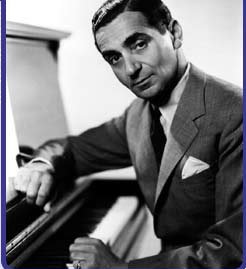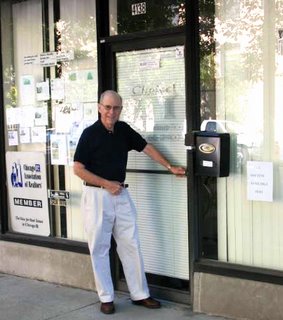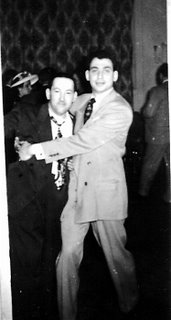
The more famous Irving Berlin never learned how to play a piano or read music beyond a basic level, but wrote over 3,000 songs and also produced 17 film and 21 Broadway scores. Born to a Jewish family in Russia (like my father) this Irving died of a heart attack at the age of 101. Lyrics for Blue Skies -- the 1926 hit song that was featured in the first talkie, Al Jolson’s The Jazz Singer -- close out this post. I selected this number out of Berlin’s enormous repertoire because it seems to capture my dad’s philosophy of life.
The second Irving Berlin is the father of Howard Berlin, who is married to my friend, Norma. I chose the story of Howard and his father Irving because these Berlins were a grocery store family like mine. Perhaps these two Irvings have already met in the food aisles of the afterlife; but if not, they can get acquainted here in cyberspace.

This is a photo of Howard taken recently at 4138 N. Sheridan Rd. in Chicago’s Uptown neighborhood where one of his family’s two stores stood. Howard’s experience as a grocery kinderlach mirrors my brother Ron’s because both sons helped out by working in the store and by making deliveries.
An anesthesiologist today, Howard recalls his early “mom & pop” days: “One of the major problems of having a small store was the time needed to keep it going. My father was a hard worker and spent long hours in the store. I remember, especially after the war, my father bemoaning the growth of the chain stores – the A & P and National. When my father was forced to retire in 1949 his complaints stopped. Now he was a big fan of the chain stores and looked for the bargains. I don’t think my family ever shopped in a small grocery store again.” (Howard’s dad suffered two heart attacks before he retired, and lived another 20 years. He died at the age of 73 after his seventh – yes, seventh – and final attack. What’s with Jewish men and heart disease?)
As for my own dad, Irving Shapiro, he left the grocery business in 1951; and once more, I’ll send you to the pages of THE DIVISION STREET PRINCESS for details. But here his similarity with Irving Berlin (the grocer, not the songwriter) ends, because my Irving was hardly a bargain hunter. Dad lived life in excess (remember the four risk factors) and spent money even if his pockets were bare.

I’ve included a photo of my dad taken at Ronnie’s bar mitzvah in 1948. I love this picture because it shows Dad having a swell time. My mother’s youngest brother, Hy Elkin, is pictured dancing with my boozy father. To accompany the photo, I’ve submitted a paragraph from the book -- evidence of my childhood angst about carefree Irving Shapiro:
“Several of my young uncles took turns breaking from the ring to dance the kazatska in the center. With arms folded across their sinewy chests, they squatted almost to the floor, shot their legs alternately out in front of them, then hopped upright with a whoop. We clapped and cheered to egg the boys on. But when my shikker father leapt dizzily into the spotlight, I became alarmed. Didn’t the doctor tell him to watch himself? To stop smoking? To lose weight? Didn’t the doctor warn Dad that his diabetes could weaken his heart as it did his feet, his gums? He had almost lost a limb to gangrene, and I had already witnessed Dad’s false teeth floating nightly in a drinking glass. What other part of his body would be next to fail?
Yanking the elbow of his herringbone suit, and shouting to be heard over the orchestra’s horns and relatives’ hoots, I screamed, ‘Daddy, stop, you’ll get sick!’
With his brown eyes as bright as the morning’s Eternal Flame, Dad brushed my anxious hand from his sweat-soaked suit, and slurred, ‘I’m having a good time, Princess, let me have a good time.’”
Blue Skies by Irving Berlin
I was blue, just as blue as I could be
Every day was a cloudy day for me
Then good luck came a-knocking at my door
Skies were gray but they’re not gray anymore
Blue skies
Smiling at me
Nothing but blue skies
Do I see
Bluebirds
Singing a song
Nothing but bluebirds
All day long
Never saw the sun shining so bright
Never saw things going so right
Noticing the days hurrying by
When you’re in love, my how they fly
Blue days
All of them gone
Nothing but blue skies
From now on
[2]
I should care if the wind blows east or west
I should fret if the worst looks like the best
I should mind if they say it can’t be true
I should smile, that’s exactly what I do
1 comment:
Elaine,
i am reading Divison Street Princess right now, in China, and loving every page. You write wonderfully, you evoke a certain in America magically, you have created a very important memoir. I am loving every page, half through right now, and the photos also ADD a lot to the book, too.
I have one idea: I feel your book is so important in Americana culture and Jewish-Americana cultural archives, that your book should eventually be entered onto an online Internet site, free of charge, so that readers in the future, and I mean the FUTURE, Elaine, like 500 years from now, can also read your memoir! Of course, first is to sell the book, but after you have finished selling the book as a physical book, and I LOVE reading it right now as a book, sitting in my armchair, turning each page slowly and writing on the pages, marking things, underlining things, circling things, I LOVE IT, someday, maybe next year, you should really think about putting your book online FREE for future generations. I have done that with two of my books and who cares about money, after a certain point?
Think about it. YOUR book deserves a worldwide future audience forever, and online is the way to go. After the print copies are sold out, is there some way you can key in all the pages? In the long run, this will also help sell the printed book too.
Danny
Post a Comment